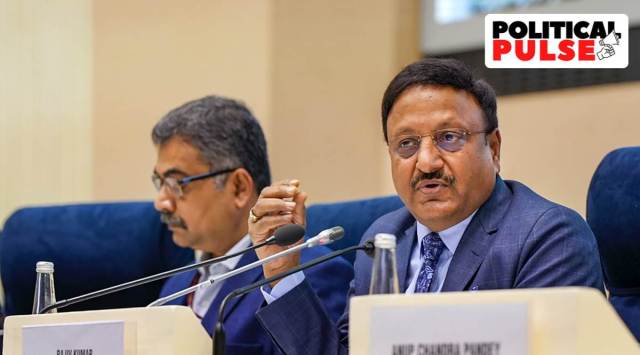Flashback 2017 as EC again skips Gujarat in poll schedule announcement
The two states had gone to polls together from 1998 till 2017, barring 2002-03, on account of the riots
 Chief Election Commissioner Rajiv Kumar speaks during a press conference for the announcement of schedule of assembly elections in Himachal Pradesh, in New Delhi, Friday, Oct. 14, 2022. The elections will be held on November 12, while the counting of votes will be on December 8, the Election Commission announced on Friday. (PTI Photo)
Chief Election Commissioner Rajiv Kumar speaks during a press conference for the announcement of schedule of assembly elections in Himachal Pradesh, in New Delhi, Friday, Oct. 14, 2022. The elections will be held on November 12, while the counting of votes will be on December 8, the Election Commission announced on Friday. (PTI Photo)At a press conference on Friday, the Election Commission (EC) was expected to announce the poll schedules for Gujarat and Himachal Pradesh together but only released the schedule for the latter.
“We are following past precedence in keeping the announcement of dates for Gujarat in abeyance for now,” Chief Election Officer Rajiv Kumar said, adding that the announcement of multiple state polls together leads to longer wait time for declaration of results for some.
This is not the first time. Back in 2017, both the states were set to go to polls together as well. In fact, they have been since 1998, barring 2002-03. But on October 12, the announcement date, the EC only declared the dates for Himachal, similarly adding that Gujarat polls will be announced later. That year, Himachal Pradesh went to vote on November 9. Gujarat voted in two phases on December 9 and December 14. The results for both states were announced on December 18, 2017.
An Indian Express report from the time noted how the EC’s announcement “broke from convention” by not announcing the polls “simultaneously…even though the terms of the two state Assemblies expire within two weeks of each other”.
Criticism also followed the decision with former Chief Election Commissioner S Y Quraishi saying the decision raised “serious questions”. The Congress, the leading Opposition party in Gujarat, alleged that the BJP had pushed the EC to delay the announcement.
The convention holds that the EC normally holds elections together in states where the incumbent governments are completing their five-year term within six months. The poll dates for these states are announced simultaneously as well. The term of the Gujarat Assembly ends on February 18 next year, while Himachal Pradesh’s ends on January 8.
Speaking to The Indian Express, Quraishi said, “This raises some serious questions. The terms of the two state Assemblies are almost coinciding. So why should the EC wait to announce dates for Gujarat?”
The announcements together have been a pattern with the exception of 2002-03 after the Godhra riots, when the Gujarat Assembly was dissolved prematurely.
Defending the decision to announce Gujarat elections later in 2017, then Chief Election Officer Achal Kumar Joti told reporters that this was done to avoid an unreasonably long imposition of the Model Code of Conduct (MCC) in the state.
At the time, Joti also said that the MCC should not exceed 46 days. (The MCC during the Gujarat and Himachal Pradesh polls in 2007 and 2012 was in force for 83 days, which, he felt, obstructed governance). As per him, an additional factor that influenced the decision was to continue flood relief in the state, which would have been disrupted by the MCC.
“The Chief Election Commissioner has already clarified that voting in Gujarat will wind up before Himachal results are announced. If that’s the case, then Gujarat votes will be counted within a week of Himachal, if not on the same day. So how many days of MCC have you spared Gujarat? A week maybe? What does that really achieve?” Quraishi had questioned then.
The MCC is a code that aims to provide a level-playing field for all players during elections by guiding the conduct of the incumbent government, other political parties and candidates in the fray. The government in power, for example, cannot announce any decisions that could potentially influence voters. MCC comes into effect from the date of announcement of poll dates and lasts up to the day of voting.
The Congress alleged that the BJP had pushed the poll panel to delay the announcement of Gujarat elections to announce some last-minute sops for voters in the state.



- 01
- 02
- 03
- 04
- 05




























